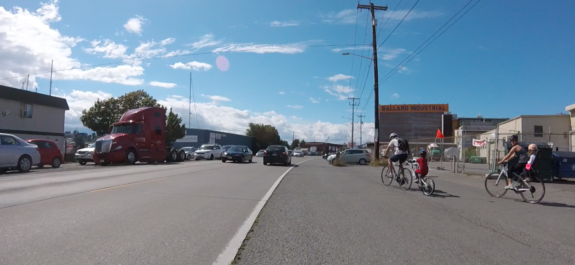Fewer fights like the Missing Link? Seattle limits ‘weaponized’ environmental review appeals

Environmental review has been used to maintain dangerous conditions for people biking through the Ballard Missing Link.
Just about everyone who first learns about the decades-long Burke-Gilman Missing Link legal battle is baffled when they hear that this delay is under the guise of "environmental review." It's a biking and walking trail! Isn't safer biking and walking inherently good for the environment?
They're not wrong. A process that should prevent degradation of the environment was instead being used to prevent the city from completing a project that would improve the environment, and that's just nonsense. The process puts proposed projects on trial, but not the status quo. And the status quo can be pretty terrible to the environment.
To be clear, "environmental" in this legal sense is defined very broadly, including things like traffic and economic impacts, supposed negatives that can sometimes work against what the average person might associate with the term "environment." When massive freeway projects like the Alaskan Way Viaduct Replacement and the 520 Bridge Replacement Projects cruise through faster than a mile of biking and walking trail, there is a serious problem with the process.
The other problem is that environmental appeals are a tool available almost solely to wealthy individuals, groups and businesses. And it is so effective at delaying projects that even the threat of an appeal can get wealthy interests what they want as we saw clearly on Westlake.
First, some neighbors held the entire Bicycle Master Plan update hostage to get their way. One could argue that this is an example of environmental review working for the people, though it was very frustrating that the entire citywide plan was held up in the process. The result was a grueling and unprecedented level of community input in the bikeway's design details in which a stakeholder committee met many times to go inch-by-inch over the design and debate design decisions to find a compromise. But even after all that, "super yacht" marina Nautical Landing still wanted more public parking spaces in front of their marina and appealed the bikeway, anyway. Even though this one business was going against the community compromise, they got their way because the threat of indefinite delay through environmental review was too great to risk a fight. This was unjust and unfair.
Ultimately, the bikeway was completed, but it was long delayed, cost far more than it should have and has one stretch in front of the marina that is squeezed below modern bikeway standards. But at least it was completed, unlike the still-incomplete Burke-Gilman Trail.
So, will CB 119600 (sponsored by Abel Pacheco and Mike O'Brien and passed 8-0) prevent or at least speed up another Missing Link-style appeal? Honestly, I can't say. People with enough money to pay lawyers whatever it takes to fight something always seem to find ways of getting what they want (or at least delaying what they don't want). But the ordinance takes some steps to remove some of the requirements appellants have used in the past. For example, while the economic impact of a project is still subject to appeal, the ordinance added, "Analysis of the potential economic impacts related to individual businesses is not required." Hmmm, that sounds like a good idea.
Most of the conversation and ordinance language is specific to housing projects, especially low-income housing and housing near transit service. I am not a lawyer, so I can't say for sure how this change will affect trail projects. And, honestly, nobody will really know how effective it is until the next appeal hits the Seattle Hearing Examiner's desk.